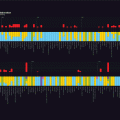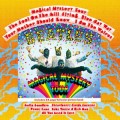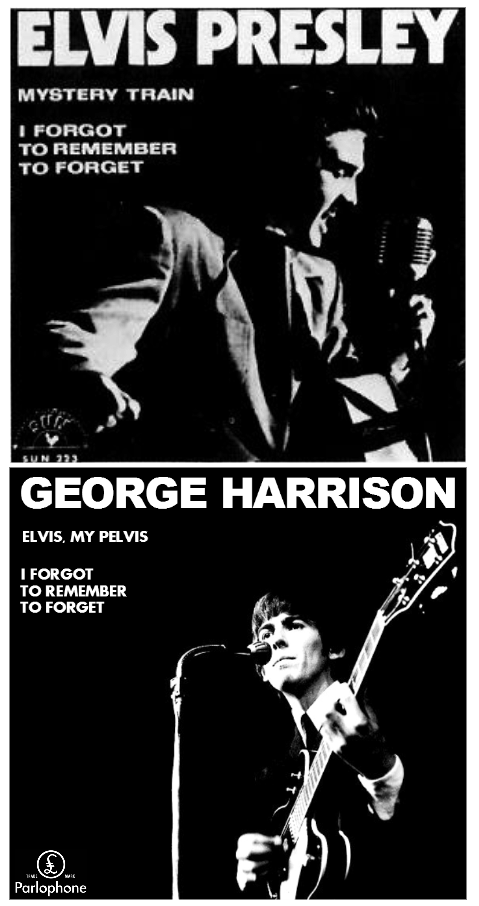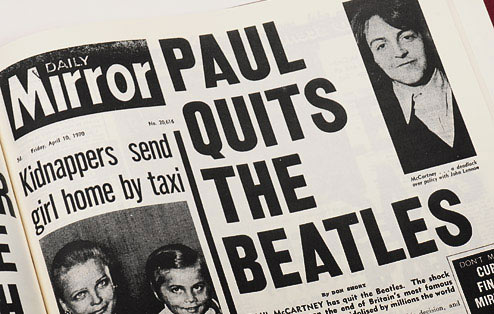Latest posts by Ed Park (see all)
- Bring on the Lucie by Hallelujah the Hills - October 9, 2015
- Experiment: Two Words - July 27, 2013
- POV - July 19, 2013
A while back we featured the blog “They May Be Parted,” devoted to the Nagra Reels. Here’s Dan again—using this familiar George statement as a jumping-off point. Well worth a read.
George: OK, I don’t mind. I’ll play, you know, whatever you want me to play. Or I won’t play at all, if you don’t want me to play. Whatever it is that will please you, I’ll do it.






Wow. Could anyone but Paul understand what this meant: “So we’ve probably got to get some system to get through like 20 or 30 and no more. … And it’s probably going to be like sculpture. So that we get all the chords, so we can all vamp them all. Then we can all play every solo we need.”
There are five levels….
Red Norvo was a vibraphonist with his own big band in the 1940s. Norvo was considered a virtuoso on the instrument. His singer was his wife, Mildred Bailey.
Red Norvo was a virtuoso vibraphonist with his own swing band in the 40s. His singer was his wife, Mildred bailey.
What has always brought this dialogue back to me is the fact that Paul was absolutely right next to let George do his beloved guitar interjections on “Hey Jude.” George’s solo albums are full of such doodles and diddles and while they are executed with unfailing precision, as an IDEA they are often quite tasteless. Listen to the lamer bits of “Living in the Material World” and “33 1/3,” or almost the whole of “Extra Texture,” “George Harrison,” “Gone Troppo.” They are mediocre to lousy albums in every way, but those damn filigrees between lines of a vocal DO NOT HELP. The best specific example I can come up with instantly is “Real Love,” a bastard concoction for which I, unlike a lot of Beatle people, feel real love. George does little guitar squiggles after each line starting with the second verse, and to me they are the only blemish on an otherwise perfect piece of pop.
The hallmark of George’s brilliance as a guitarist was his restraint. The phenomenon of call-and-response between a vocal and his guitar strikes me as a rare show of instrumental ego on his part, and one that Paul (no stranger to ego dynamics himself I’m sure) was right to resist. I’ve always imagined, in fact, that Paul knew the squiggles on “Real Love” were a mistake, but let George have his way on it because of the earlier (and by then quite famous) “whatever will please you” exchange!
A glimpse at some of Red Norvo’s song titles makes me wonder if Paul took thematic lyrical inspiration:
“The Weekend Of A Private Secretary”
“Smoke Dreams”
“Dance Of The Octopus”
etc.
– Hologram Sam
Thanks so much for the mention again! Truly love you guys.
Devin — I’m on board with you (and also as a “Real Love” lover). Whatever take that was of “Hello Goodbye” that’s on Anthology with all the extra guitar, that pops into my head as another easy example of it being much too much (and thankfully abandoned).
These guys were really great editors — when together, and in tandem with George Martin. Certainly shows when they were left to their own devices…
Dan: Nice to know there’s more “Real Love” love out there. (Greil Marcus is also a big RL fan, for those of us who might find that of interest.) And your Nagra site continues to kill. What a boon it would be to the Beatles library if that were to be compiled and published one day, as augmentation and enlargement of the Sulpy volume. Ebook download, perhaps? I’d pay for that the day it became available.
Ingrid: Have you ever seen the photo-and-text book that accompanied the UK release of the Let it Be album? It transcribes long chunks of Beatle dialogue (Lindsay-Hogg occasionally in the mix), most of which was not in the film. If those transcriptions are accurate, then not just Paul but all of the Beatles spoke in the same crazy code. (They actually did have codenames around that time: Ringo was CODENAME RUSSIA, hence the Get Back boot of that title.) But the sentences they throw at each other are precisely of that crazy-quilt cadence, with meanings and references (not even to specific places, people or things but to IDEAS) known only to the four guys themselves. It’s fascinating and poetic to read, but it makes as little sense to you and me as Paul’s “sculpture” bit. Among the best evidence I’ve seen that the four of them shared a telepathic bond, a kind of communication no one could penetrate or even understand.
What a great post, Dan. And Ed, thanks for linking.
Jesus Christ, it’s difficult to understate how much I HATE these sessions. Perhaps it’s all those $40 “Son of Daughter of Cousin of Sweet Apple Trax” boots I bought back in the 80s…
It’s like a point of theory, this, isn’t it? It’s not just to do with playing music. Far further reaching, this thing.
FWIW, I don’t think we’re hearing the band agreeing to break up; I think we’re hearing them try to establish a working method more appropriate for four fully developed creative talents. By January 1969, each of them now knows what they want their stuff to sound like from the beginning–like Lennon often seemed to from the get-go, and McCartney often seemed to after “Yesterday.” And their tastes aren’t always the same, though (as the solo years showed) each other’s presence tended to really improve the tracks.
I think John’s disinterest–physically not playing on George stuff–is much more the key to the breakup. Because George is right to say, “I’ll play whatever you want, or not play”–it’s Paul’s song, and he knows it; I’m sure George and John had a million such interactions, just never caught on film. The real fissure comes when J&P don’t extend the same “at your service” courtesy to George, beginning with the return from India. That’s when the group dynamic is betrayed, IMHO. And we see with Abbey Road that this new working method–while we can say it was being each other’s “backing group”–produced stuff that was considered then, and is considered now, quintessentially Beatles music. When J&P really commit to a George song, like “Something” or “Here Comes the Sun”–it’s as good as anything the Beatles ever did. But it’s unquestionably George’s song, and there’s no doubt he had “final cut” on it…because if he’d hadn’t, he would’ve bitched for the rest of his life.
Paul: I’m scared of that, ‘You be the boss.’ I have been for a couple years. We all have, you know? Not pretending about that. … And that’s what we decided, you know?
Now this is tremendous, because it shows McCartney’s ambivalence towards the role that we all assumed (thanks to Lennon Remembers) that he gleefully leapt into post-Brian. But that glee doesn’t really fit with the guy Paul was before 1967; nor does it fit with a lot of the things he’s said, like how he likes being “second banana.” I’ve worked with several really prodigious talents–writers easily capable of running the show, full of ideas and energy and forward motion, just like McCartney–who for reasons of personality really never feel comfortable being the frontman. Of anything. I think it was probably somewhat difficult for McCartney to take the reigns, and his discomfort at doing so was a large part of his “bossiness.” He’s overcompensating.
Dan, I swear to God, I don’t know how you listen to all this stuff. But I’m glad you do!
“I’ve always imagined, in fact, that Paul knew the squiggles on “Real Love” were a mistake, but let George have his way on it because of the earlier (and by then quite famous) “whatever will please you” exchange!”
And that — in a sentence — is why the Beatles had to break up. Because they had reached a point where they weren’t doing what was best for the song, but were dancing around each other’s egos.
And Devin: I totally agree with you about those guitar doodles on George’s albums.
— Drew
Oh and the fascinating thing about Paul’s “sculpture” sentence is that George Harrison seemed to understand what Paul was saying perfectly and even used he sculpture phrase himself.
— Drew
“The real fissure comes when J&P don’t extend the same “at your service” courtesy to George, beginning with the return from India. That’s when the group dynamic is betrayed, IMHO.”
Michael and others: Do you think that a key reason why John and Paul were resistant to George’s songs during both the White Album and the Let it Be sessions was at all because they were kind of irritated by the whole India trip? Like, “OK George, we followed you all the way to fucking India, and look what happened? Ringo got sick, the maharishi turned out to be a big fake, and all we did was get on each other’s nerves. We don’t feel like following you anymore. And by the way, your religious obsession is boring the hell out of us.”
Couldn’t that have been behind their disinterest. I have a relative who I used to like who became a religious fanatic and bores me to tears — to the point that I avoid talking to her. I can’t help but think John and Paul both found the constant Hari Krishna stuff to be a deadend for them, and kind of irritating.
— Drew
Sorry for the flurry of posts. I kept having an additional though. 🙂
because they were kind of irritated by the whole India trip?
Oh heck yes, Drew. I personally have always found George to be somewhat tedious on religion, weirdly fundamentalist and strangely undigested (I mean, not letting dogs in Friar Park because they’re “GOD” spelled backwards?)–and I speak as someone who’s meditating and reading Eastern philosophy like a fiend these days.
I forget where I read it, but I think one of them actually said, “We let George lead us to India, and that didn’t work out.” The Maharishi was definitely George’s thing, or perceived so, or claimed to be, after it wasn’t what J/P/R were looking for. That’s as much about J/P/R as the Maharishi or TM–and the older I get the more I think the Maharishi’s sex life was an excuse. Maharishi overpromised, John got bored, and the world–especially the world of a Beatle circa 1968–is difficult to resist. Meditating six, eight, nine hours a day for two months is enough to drive anybody batty.
IMHO, there’s no mystery why The Beatles didn’t record “Circles,” it’s a suck song. (No offense George.) But I think J&P couldn’t hear a lot of the stuff that ended up on ATMP, because all they heard was the religious content of the lyrics.
Eastern Religion was George’s Yoko–probably for a lot of the same reasons.
No squiggles on studio “My Sweet Lord,” but whoever played guitar on the 1974 tour version — not George on acoustic guitar– squiggles away and it is not good.
Dan, this is a great series of posts (though I’m another who approaches all the “Get Back” / “Let It Be” material with great trepidation, when I approach it at all). But your comment about what happened when the Beatles were left to their “own devices” is perfect.
I feel sorry for ALL the Beatles, reading your analysis. They’ve lost Brian Epstein, such an important force in negotiating between the group and the world, and now they’re trying to work without George Martin, who brought such focus and direction to their studio sessions. It’s telling that he agreed to do “Abbey Road” if they would do it in the “old way.”
In the absence of a figure outside the band to keep things on track, it was inevitable that someone within the band would try to play that role when things started feeling formless. Maybe they could have negotiated a way to work as a group without an outside figure’s structuring the sessions, but things would have had to be very different (no filming, and just the four of them + crew) for that to be at all possible.
That line of Paul’s about being scared of trying to be “the boss” makes perfect sense. But he clearly can’t stop himself from trying to run things. He cares about the quality of what they’re doing, even if he expresses that too bossily sometimes.
Anyway, thanks for this thought-provoking series of posts. You’ve convinced me of the value of the Nagra reels!
First to everyone, once again thanks so much to everyone for the nice words.
Devin – Book idea had been in the back of my mind, but has steadily crept forward, especially given the incredible response from just the kind of readers I was hoping to connect with.
Ingrid – You can pull down a PDF of the Get Back book Devin was referring to here: http://www.beatlesource.com/bs/mains/audio/GetBack/GetBackBook.pdf
Michael – How do I do I listen to all this stuff? Well, I’m just finishing up the third day of the sessions now — and I started more than a year ago. So small doses help! (I’ve shut them off more than once, not being able to deal with them). Really, it’s the dialogue I’m beginning to crave much more than the music, since we know from 40 years of bootlegs, the music leaves so much to be desired (often). And I know I don’t have to tell you that.
Nancy – I really can’t wait to see what’s still to come in the tapes. I know Jan. 6 is a bit of a treasure trove (so to speak) with things really starting to break apart, and the big dreams of the live show.
Anyway, thanks again, everyone. “Carry That Weight” next on the agenda in the next day or so.
-DR
I love it, my two fav blogs are becoming one!
Loving all the dialogue re leadership and breakup. It makes me think of a line I heard this weekend while watching the new Eagles documentary on Showtime. I know I know, the Eagles? But I just love music docs and couldn’t stay away and I’m glad I didn’t. It was entertaining and sometimes I forget that they actually did write some solid tunes. Lebowski has almost ruined the Eagles for me…
Anywayyss, the line I heard was spoken by the Eagles manager who, when answering a question about what he did for the Eagles in the 70’s said something along the lines of “I spent all my time making sure they didn’t break up.” And another member of the group said something like, “In my experience, rock groups are always one argument away from breaking up.”
After quotes like these and knowing all I know about the Beatles, I’m amazed they lasted as long as they did, post-Brian.
-Craig